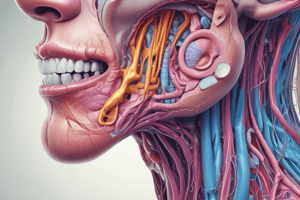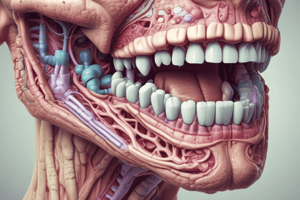Podcast
Questions and Answers
What is the mode of secretion in a merocrine exocrine gland?
What is the mode of secretion in a merocrine exocrine gland?
- Disintegration of the cell and its content
- Secretion of the cell content through rupture of the cell membrane
- Secretion of the cell content while keeping the cell membrane intact (correct)
- Pinching off of the cell
Which of the following statements about salivary glands is correct?
Which of the following statements about salivary glands is correct?
- Salivary glands are endocrine glands that produce and secrete saliva
- Salivary glands are holocrine exocrine glands that produce and secrete saliva
- Salivary glands are apocrine exocrine glands that produce and secrete saliva
- Salivary glands are merocrine exocrine glands that produce and secrete saliva (correct)
What is the primary function of saliva in the digestive process?
What is the primary function of saliva in the digestive process?
- Saliva aids in the swallowing of food
- Saliva initiates the breakdown of proteins in the oral cavity
- Saliva begins the breakdown of carbohydrates in the oral cavity (correct)
- Saliva lubricates and moisturizes the oral cavity
What is the primary protective role of saliva in the oral cavity?
What is the primary protective role of saliva in the oral cavity?
How many main types of salivary glands are there?
How many main types of salivary glands are there?
Which type of salivary glands secretes a mixture of serous and mucous secretions?
Which type of salivary glands secretes a mixture of serous and mucous secretions?
What is the main difference between merocrine and holocrine exocrine glands?
What is the main difference between merocrine and holocrine exocrine glands?
Which gland is classified as a pure mucous gland according to the type of secretion?
Which gland is classified as a pure mucous gland according to the type of secretion?
What is the most common site for a stone formation in the salivary glands?
What is the most common site for a stone formation in the salivary glands?
Which gland is predominant in secreting serous secretions?
Which gland is predominant in secreting serous secretions?
Which salivary gland is classified as major and predominantly secretes mucous secretions?
Which salivary gland is classified as major and predominantly secretes mucous secretions?
What type of gland is responsible for the secretion of saliva?
What type of gland is responsible for the secretion of saliva?
What type of glands interfere with salivary gland function when there is a stone present in the duct?
What type of glands interfere with salivary gland function when there is a stone present in the duct?
What is the main enzymatic activity found in the zymogen granules of salivary glands?
What is the main enzymatic activity found in the zymogen granules of salivary glands?
Which staining technique can be used to visualize mucigen granules in the salivary glands?
Which staining technique can be used to visualize mucigen granules in the salivary glands?
Which method of fixation reveals the alignment of mucous and serous cells in the salivary glands?
Which method of fixation reveals the alignment of mucous and serous cells in the salivary glands?
Where are the secretory proteins synthesized in serous cells before their release through exocytosis?
Where are the secretory proteins synthesized in serous cells before their release through exocytosis?
What is the main function of the mixed acini in salivary glands?
What is the main function of the mixed acini in salivary glands?
Flashcards are hidden until you start studying
Study Notes
Salivary Glands
- Salivary glands are merocrine exocrine glands that produce and secrete saliva, involved in the digestive process and protection of oral tissue.
Types of Salivary Glands
- Major salivary glands:
- Parotid glands
- Submandibular gland
- Sublingual gland (major)
- Minor salivary glands:
- Labial and buccal glands
- Palatine glands
- Glossopalatine gland
- von Ebner gland
- Weber gland
- Blandin – Nuhn glands
- Minor sublingual glands
Classification of Salivary Glands
- According to size:
- Major salivary glands
- Minor salivary glands
- According to type of secretion:
- Pure serous glands: Parotid gland of adult, von Ebner gland
- Pure mucous glands: Palatine glands, Glossopalatine glands, Weber glands, Minor Sublingual gland, Labial glands
- Mixed glands: Parotid (of infant and old age), Submandibular gland, Sublingual gland, Buccal glands, Blandin – Nuhn glands
Characteristics of Salivary Gland Cells
- Serous acini:
- Have enzymatic activity (amylase, DNAase)
- Stain with iron hematoxylin and PAS
- Mucous acini:
- No enzymatic activity
- Stain with mucicarmine
- Mixed acini:
- May be intermingled, with serous cap over mucous blind end, or separate lobules
Protein Synthesis and Secretion
- Serous cells:
- Synthesize secretory proteins in RER
- Modify proteins in Golgi apparatus
- Store proteins in secretory granules and release through exocytosis
Clinical Comments
- The dentist must examine the mouth carefully and take radiographs to detect any stones in the submandibular duct, which can interfere with salivary gland function.
Studying That Suits You
Use AI to generate personalized quizzes and flashcards to suit your learning preferences.




